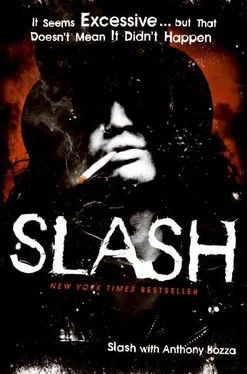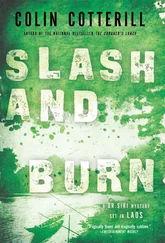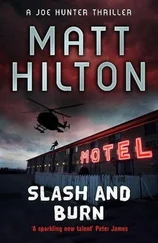The first major issue, of course, was in St. Louis, which is well documented in the press. Axl had a beef with a guy in the first few rows who had a video camera. Axl mentioned it to venue security and they did nothing about it. Their attitude and the guy’s blatant disregard really set Axl off, so he jumped out into the crowd to take his camera away. When he jumped down, it was great, we kept playing that suspenseful riff that starts off “Rocket Queen,” and I thought the whole moment was killer. When Axl got back onstage, everything felt triumphant for a second… then he grabbed the mike, said something like, “Because of the bullshit security, we’re going home,” slammed the mike down, and walked offstage.
The band kept going. We’d gotten good at improvising to fill dead space—drum solos, guitar solos, jams—we had a bag of tricks to keep things moving whenever Axl made a sudden exit. We kept jamming, and I went over to the side of the stage.
“Where is he?” I asked Doug.
He looked at me with a pained expression. “He’s not coming back.”
“What do you mean he’s not coming back?” I shouted, still playing the riff.
“There is no way he is coming back,” Doug said. “There’s nothing I can do.”
We were about ninety minutes into our set, which was our minimum, contractually, but the plan was to play a two-hour set and the crowd wasn’t close to satisfied. They knew there was a lot more left. I would have done anything to get Axl back onstage at that point.
“Ask him again!” I yelled. “Find out if he’s really not going to.” I should have known by Doug’s expression that there was no use.
Once it was final, we had no choice: the band put down our gear, and it was like pulling the plug on the stereo—the song just ended on a question mark. That entire arena sat there expecting something to happen, but instead we walked offstage without a word. And that set them off. We had no idea how much that set them off.
We all gathered in the dressing room, Axl wasn’t there, and the mood was pretty solemn, to say the least. And that’s when the racket started. We could hear this pounding; even through the doors, it sounded like mayhem. Axl suddenly came into the dressing room and said, “Let’s go back on.”
We went down the hallway toward the stage and it was like the scene in the Beatles’ Yellow Submarine where they’re walking through a hall and it’s normal but every time they open a door there’s a train coming at them or a cat screeching: we’d open a door and there was yelling, we’d open another and see people on stretchers, cops with blood all over them, gurneys everywhere, and pandemonium. At the time we were shooting a documentary, so we have a lot of it on film.
The St. Louis locals weren’t having our cancellation—they tore the entire building apart; they did things that I didn’t think were possible. It was daunting, if anything—we learned not to fuck around with crowds to that extent. Axl, at least, should have been more wary from that point on not to take an audience to that level of agitation ever again.
We were trapped backstage, not knowing what to do. Doug suddenly appeared and said that he had to get us out immediately and that there was a police escort in the loading dock. We ducked down in the back of these two vans so that no one would see us and we drove straight on to Chicago. There was no way that we were going to be able to play that gig because every shred of our gear was trashed in St. Louis; that show was a very expensive fluke, to say the least—the crowd did over $200,000 worth of damage to the arena alone.
We crashed in Chicago for a while as the aftermath of St. Louis was added up. It was a major disaster for the people, and for the city, and Guns N’ Roses was banned from playing in St. Louis forever.
When I returned to St. Louis with the Snakepit in 1995, the night before my show, I was walking from my hotel down to this row of bars nearby. I wasn’t going far, so I didn’t bring security because I knew that I was meeting our crew down there, but as I walked up this main drag, I saw five bikers in front of me and no one else around and for a moment I got worried. It was a pretty dark night on a pretty dark street, where tall streetlamps illuminated spots of ground every few yards. I got closer to them and they were looking at me; and I was looking at them. One of them got off of his bike and came at me and I wasn’t sure how it was going to go down.
“Hey, man,” he said, grinning wide. “I’m the guy who Axl hit.” Like I was supposed to pat the guy on the back. He had this attitude like, “Hey, we’re both anti-Axl, right?” He seemed to think we had something in common, but I don’t work like that; if any of you talk shit about Axl I’m going to get up in your face. Only I can do that; because I have that right, not some punk on the street who doesn’t even know him. Things got tense in that moment, but the guy started in with his own story, almost apologetically.
He had just won all of his money in the lawsuit; I think he’d been awarded his damages by the court like two days before. It was a tense situation: it was obvious to me that this was a guy who was riding high on that cash he’d just gotten and he wasn’t going to spend it wisely. His “friends” seemed to be enjoying his good fortune with him, that was for sure, because all of them were clearly out on the town. He was the shortest of the bunch, and as all small guys do, he was trying to impress everyone in sight. He had earned his bragging rights—and a decent amount of our cash—but as he told me in the few minutes I paused to speak with him, in the days after the incident, he couldn’t even leave his house. He received death threats by phone, hate mail, all of it. Only after the city won the lawsuit—after which he won as well—did the whole tide turn for him.
I was totally not impressed with this guy. I told him so and that I had to go and that was that. So where was I?
WE TOOK A FEW WEEKS’ BREAK AFTER that incident in St. Louis, and put the final touches on the Illusion albums. We celebrated with a few shows at the L.A. Forum, which was a highlight of the band’s career. When I thought of the Forum, I thought of Bowie, Zeppelin, Aerosmith, and AC/DC; it is an iconic place. In terms of local bragging rights, it was like playing the Long Beach Arena—but better. I don’t know how the other guys felt about it, but as the limo came down that ramp all I could think about was seeing Rod Stewart there with my mom; all of those stories were going through my mind. The gigs were all sold out and they were amazing . The last one we did there was three and a half hours—in the history of the band, it was the longest one we ever played. That show was July 29, 1991, the very day that the records were finished being mixed. As Axl said from the stage, “The motherfucker is done !”
While the records were packaged for release, we went on to do the other shows with Skid Row opening—you can imagine the degree of debauchery Matt, Duff, Sebastian Bach, and I got into. Sebastian was totally enthusiastic and totally green; we’d done it all before but we did it all again with Sebastian. That leg of the tour through the States to Europe was debauched and sick and took hedonism to a new level. It was way too much fun because Skid Row was blowing up at that point and was as young and hungry as we’d been with Mötley.
It’s too bad that Sebastian doesn’t like Duff and Matt and me much anymore: we tried him out when we were looking for a singer for what would become Velvet Revolver but it just didn’t work out. The combination sounded like what I’d call Skid Roses. I must say I’m surprised to hear that Sebastian has been bad-mouthing the rest of us lately.
Читать дальше
Конец ознакомительного отрывка
Купить книгу




![Сол Слэш Хадсон - Slash. Демоны рок-н-ролла в моей голове [litres]](/books/387912/sol-slesh-hadson-slash-demony-rok-n-thumb.webp)


